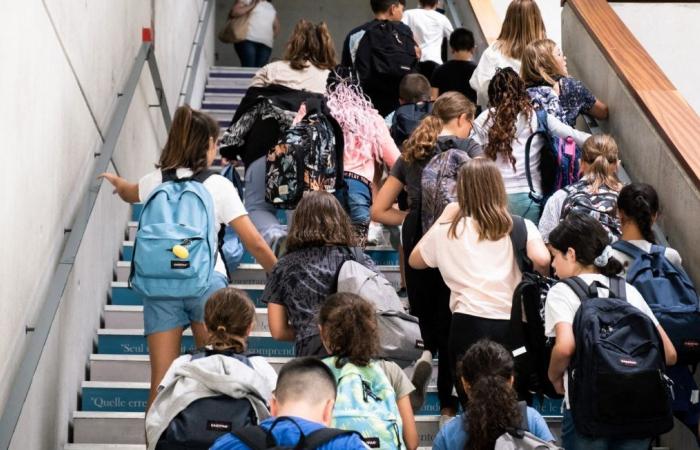
In France, only 3% of middle school students have an advanced level in mathematics, compared to 11% on the international average. Which makes us think that since its first participation in 2015 in the international Timss survey (Trends in international mathematics and science study) organized by the IEA (International association for the evaluation of educational achievement), our country does not shine.
It ranks significantly below the average of OECD and EU countries (read framed). It is Asian countries that take the top places for mathematics and science in CM1, while Chile is at the bottom of the ranking.
The Covid effect and long-term progression
In May 2023, 57 countries or provinces participated in this large-scale survey which has existed since 1995. In France, around 4,700 CM1 level students and 4,500 4th grade students were assessed. “We are observing a stabilization,” notes the Ministry of National Education, which specifies that this is good news in the sense that the cohorts evaluated experienced the Covid-19 crisis in CP for CM1 and in 6th for 4th grade. . Their results were compared to those of other students (as part of the previous 2019 study) before the health crisis.
“Student progress takes place at different phases in the school curriculum,” the ministry also puts into perspective. France lags behind in mathematics in CM1, being well below the average, it is a little less marked in 4th. And we are seeing a catch-up at the average level if we are to believe the Pisa study, which is aimed at 15-year-old students. “We must look at the schooling film as a whole,” points out the ministry. For sciences, the observation is the same: a stabilization of the level, but France remains below the average for EU countries.
How do you interpret these figures?
To conclude that French students are less and less capable of learning or that teachers are less and less invested would be to miss the problem for Lalina Coulange, university professor in the epistemology and didactics of disciplines laboratory at the University of Bordeaux. “I find it essential to affirm this, especially on the eve of a social movement that promises to be large-scale and aims, among other things, to denounce the degraded working conditions of teachers who are undoubtedly not “for nothing” in such results. Because a teacher prevented from teaching, there are also students who cannot learn…”, she reacts to 20 Minutes.
The ministry highlights the results of the TIMSS 2015 study which had been “an electric shock” and led to the 2018 mathematics plan. However, it is difficult to see its effects in the survey published this Wednesday… “What these results translated, and for almost ten years, are the difficulties of the system (including school, but not only…) and to which the French State is visibly struggling to find “solutions”. And this, despite (or because of?) educational reforms which are occurring at an increasing speed,” comments Lalina Coulange.
For a decade, international studies have ranked France at the bottom of the OECD countries in mathematics. “This hits “all students” hard, including the best, continues the university professor. But even more so the weakest since these results also reveal increased educational inequalities. »
What actions are planned by the ministry?
As part of Act II of the Shock of Knowledge, the new mathematics programs will come into force at the start of the 2025 school year. “Fractions and decimal numbers, treated until now in the middle course and evaluated among other notions in TIMSS, will now be introduced earlier in schooling, from CE1, in order to promote the acquisition of automatic mathematics among students,” explains the ministry in its press release. For middle school, it is banking on these need groups, extended to 4th and 3rd grade classes from the start of the 2025 school year, to raise the level of all students.
Our file on National Education
If the mathematics plan includes a continuing training plan for teachers, Lalina Coulanges wants to go further. We must tackle the problems of overcrowding in classes and hasty training of contract teachers. “Let us continue to think that it is enough to “know a few things” to become a teacher (or even that a good level in the discipline(s) that we have to teach is enough) and we will not solve anything current problems, I am convinced…”





